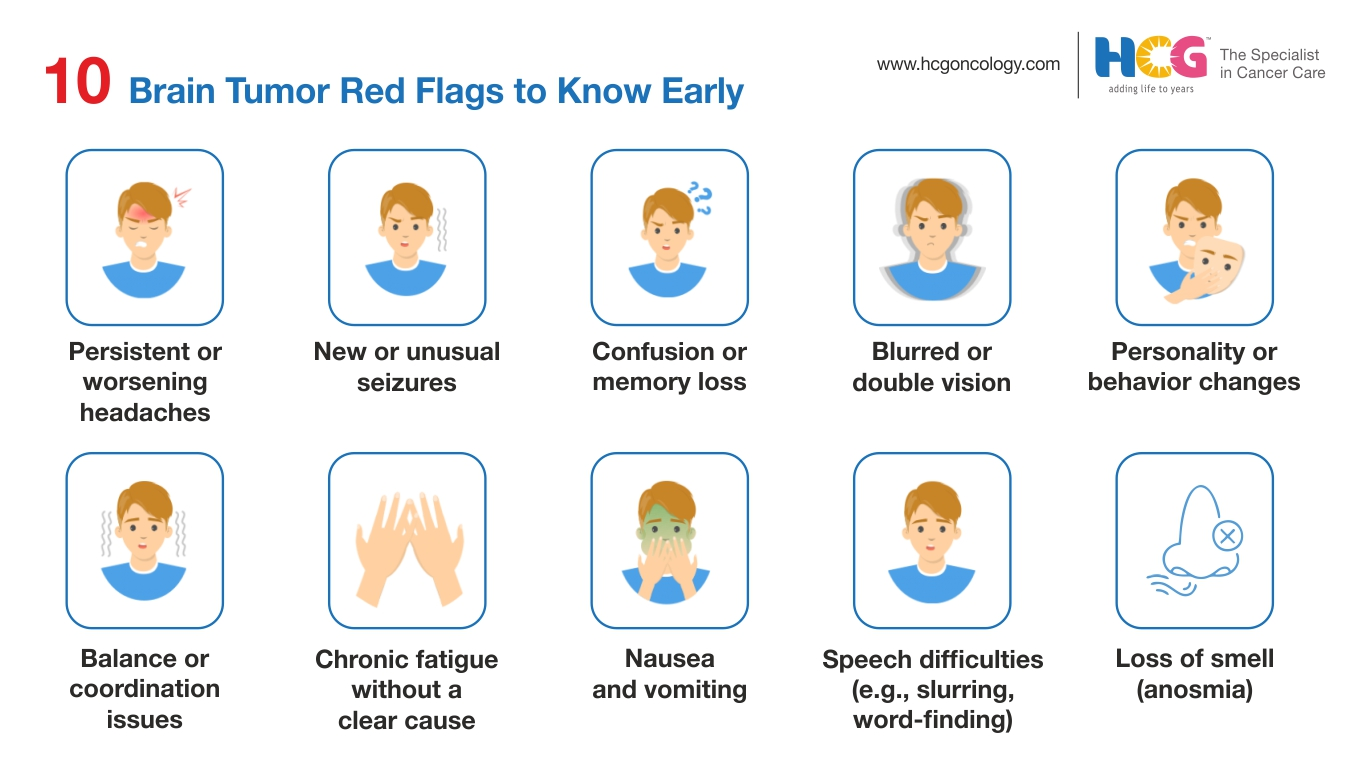
02 Dec, 2025
Feel free to reach out to us.

02 Dec, 2025

This article is medically reviewed by Dr. Amit Jain, Consultant - Radiation Oncology, HCG Cancer Centre, Indore.
Brain tumors are abnormal growths formed due to the uncontrolled division of cells within the brain. These tumors may be benign or malignant and arise from various types of brain tissue.
Symptoms depend on the tumor's size, location, and growth rate. The early signs and symptoms of brain tumors include headaches, seizures, cognitive changes, and motor deficits.
It is important to learn about different brain tumor symptoms and pay attention to persistent neurological symptoms, which can aid in timely detection and treatment.
A brain tumor refers to an abnormal cell mass formed due to the uncontrolled division of cells within the brain. These tumors may develop from various types of brain tissue.
Brain tumors can either be benign or malignant. A malignant brain tumor is also referred to as brain cancer.
Reports suggest that India records about 40,000 brain tumor cases every year. Brain tumors could be primary or secondary (metastatic).
Different options available for brain tumor treatment include surgery, radiation therapy, chemotherapy, and targeted drug therapy.
Additional Reading: Brain Tumor Treatment Without Surgery | HCG

The brain tumor symptoms experienced may vary from one patient to another. Different signs and symptoms of having a tumor in the brain are:
Headaches can be caused by various conditions.
It is a common symptom of various less serious brain- and nervous system-related conditions. However, headaches can sometimes appear as one of the signs and symptoms of a tumor in the brain, especially if they're severe, persistent, or accompanied by other symptoms like nausea, vomiting, vision changes, or seizures.
If headaches are new, different, or worsening over time, patients should consult a healthcare professional for proper evaluation and diagnosis, which may include imaging tests like MRI or CT scans.
Changes in cognitive abilities, such as confusion, memory loss, difficulty concentrating, or personality changes, may be the beginning signs of a brain tumor. These alterations may be subtle initially but can worsen over time.
While many factors can cause cognitive changes, persistent or progressive symptoms require medical evaluation.
Diagnosis often involves imaging tests like MRI or CT scans and the assessment of symptoms by an experienced neurosurgeon or neurologist.
Seizures can also be one of the early signs of brain tumors, especially if they occur suddenly in individuals without a history of epilepsy.
Tumors can irritate brain tissue, leading to abnormal electrical activity and seizures. Seizures may vary in severity and presentation, ranging from mild twitching to loss of consciousness.
A sudden onset of seizures requires prompt medical attention, as they can indicate underlying neurological issues.
Altered vision, such as blurred vision, double vision, or peripheral vision loss, can also be one of the early signs of brain tumors affecting the optic nerves or the centers for visual processing.
Tumors may exert pressure on these areas, leading to visual disturbances. While various conditions can cause vision changes, persistent or progressive symptoms require medical evaluation.
A comprehensive evaluation assists in identifying the underlying cause and helps the onco-neurologist develop a customized treatment strategy.
Personality changes, such as mood, behavior, or emotional regulation alterations, can also be the early signs of a brain tumor. The condition may affect areas responsible for personality and emotion regulation. Tumors may disrupt neural circuits, resulting in uncharacteristic behavior.
While personality changes can result from various factors, persistent or severe alterations require consultation with a neurologist. Imaging tests like MRI or CT scans can help identify brain abnormalities and develop treatment strategies to address the underlying tumor.
Balance and coordination problems, including difficulty walking or unexplained clumsiness, can be early signs of brain tumors.
These symptoms occur when tumors compress or interfere with these regions, leading to disruptions in movement. Imaging tests like MRI or CT scans can help identify the reasons for balance and coordination problems.
Sometimes, fatigue can also be one of the early signs of a brain tumor, although it is a nonspecific symptom and can occur due to various factors.
Tumors can alter normal brain function, leading to fatigue as the body expends extra energy to cope with the tumor's effects. However, fatigue is common in many conditions, so it is essential to consider other symptoms and consult a neurologist for a proper evaluation and diagnosis.
Nausea and vomiting can also be early signs of brain tumors, especially if they occur alongside other symptoms like headaches, vision changes, or cognitive deficits.
Tumors can increase pressure or irritation in the brain, which triggers these symptoms. Persistent episodes, especially without any history of neurological disorders, warrant medical evaluation.
Speech issues, such as slurred speech, difficulty finding words, or changes in speech patterns, can be early signs of a brain tumor too. When the tumor growth affects the areas responsible for language processing and production, patients start experiencing speech issues.
Tumors may disrupt neural pathways involved in speech, leading to these symptoms. Sudden changes in the speech pattern or the occurrence of slurred speech require immediate medical attention, as they may also be a sign of a stroke.
Loss of smell, or anosmia, can be a sign of a brain tumor. The condition may affect the olfactory nerve or brain regions responsible for processing smell.
Tumors can compress or damage these structures, leading to a decreased sense of smell. Loss of smell may occur for various reasons. However, loss of smell, along with other alarming symptoms, is concerning and should be evaluated by the neurologist.
Early signs of brain tumors include headaches, cognitive changes, seizures, vision problems, personality changes, balance issues, fatigue, nausea/vomiting, speech difficulties, and loss of smell. While these symptoms can result from various conditions, their persistence or worsening requires prompt medical evaluation for timely diagnosis and treatment.

Dr. Amit Jain
Consultant - Radiation Oncology
MBBS, MD (Radiation Oncology)
Dr. Amit Jain is one of Indore’s renowned radiation oncologists, with over 18 years of experience. Patients can consult him at HCG Cancer Centre, a leading cancer hospital in Indore. He specializes in the treatment of head and neck cancer, brain cancer, breast cancer, and gynecological cancers using different radiation techniques. Before HCG, he was associated with Jawaharlal Nehru Cancer Hospital (Bhopal) and Tata Memorial Hospital (Mumbai). Combining expertise with a gentle touch, Dr. Amit instills a sense of calm and hope among his patients. His care approach prioritizes open communication, personalization, and patient-centricity.
Appointment Link: Book an Appointment with Dr. Amit Jain.